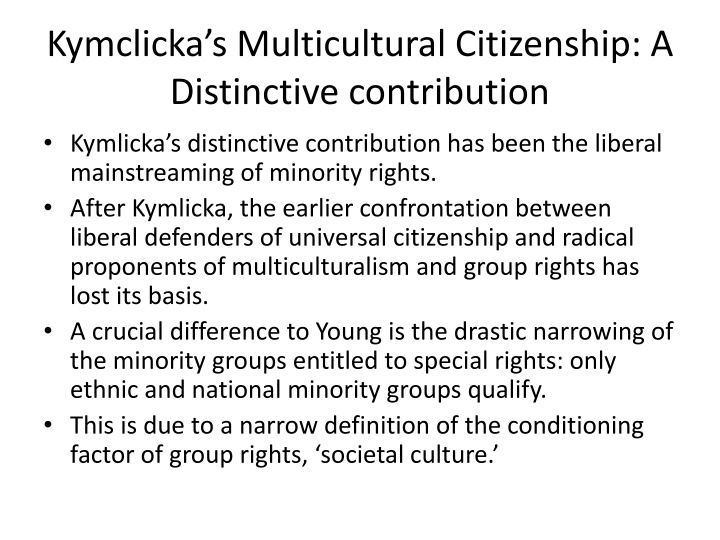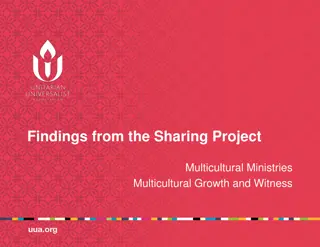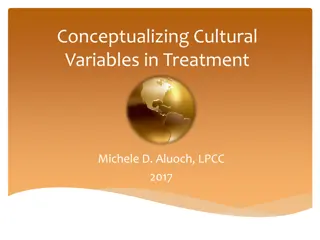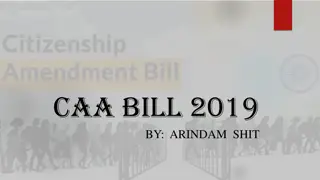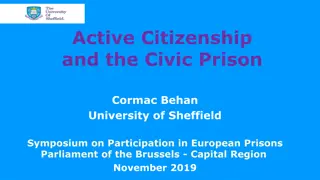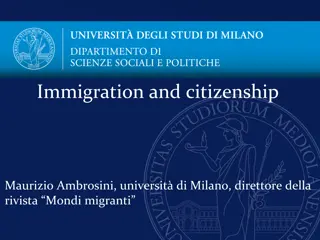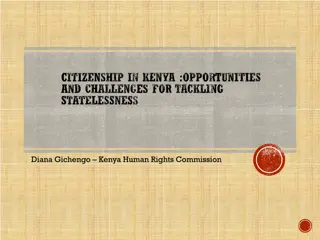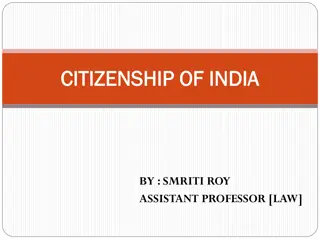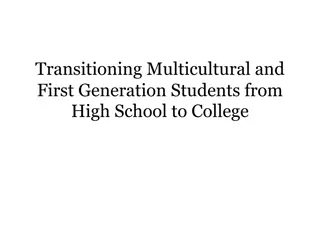Kymlicka's Multicultural Citizenship: A Distinctive Contribution
Kymlicka's unique contribution lies in the mainstreaming of minority rights within a liberal framework, shifting the discourse away from the earlier confrontation between defenders of universal citizenship and proponents of multiculturalism. His focus on societal culture and the recognition of only ethnic and national minority groups for special rights have sparked debates on the scope and implications of multicultural citizenship.
Download Presentation

Please find below an Image/Link to download the presentation.
The content on the website is provided AS IS for your information and personal use only. It may not be sold, licensed, or shared on other websites without obtaining consent from the author.If you encounter any issues during the download, it is possible that the publisher has removed the file from their server.
You are allowed to download the files provided on this website for personal or commercial use, subject to the condition that they are used lawfully. All files are the property of their respective owners.
The content on the website is provided AS IS for your information and personal use only. It may not be sold, licensed, or shared on other websites without obtaining consent from the author.
E N D
Presentation Transcript
Kymclickas Multicultural Citizenship: A Distinctive contribution Kymlicka s distinctive contribution has been the liberal mainstreaming of minority rights. After Kymlicka, the earlier confrontation between liberal defenders of universal citizenship and radical proponents of multiculturalism and group rights has lost its basis. A crucial difference to Young is the drastic narrowing of the minority groups entitled to special rights: only ethnic and national minority groups qualify. This is due to a narrow definition of the conditioning factor of group rights, societal culture.
Kymlickas Key Concept: Societal Culture Kymlicka defines societal culture as shared history, language, and territory, making it synonymous with a nation or a people . It is an intergenerational community which is more or less institutionally complete, occupying a given territory or homeland, sharing a distinct language and history. But this definition excludes non-ethnic groups, such as gays and lesbians, the disabled, or lifestyle groups, as multicultural claimants.
National Minorities and Immigrants The claims of the only two legitimate multicultural groups in Kymlicka s liberal scenario, national minorities and immigrants, differ in significant ways that ultimately militate against the very notion of multicultural citizenship. National minorities, such as the Catalans in Spain, the Quebecois in Canada, or the Aborigines in Australia, have the strongest claims within Kymlicka s scheme. i. All of them have institutionally complete cultures, that is, cultures that cover the full range of human activities, needs, and functions.
National Minorities(Cont.) ii. As the victims of nation-state building, they are forced to reside in states that do not carry the marks of their culture (most notably, their language). iii. To accommodate the potentially secessionist national minorities within multinational states, strong self- government rights are required, and also justifiable from the liberal point of view. Kymlicka does not hide the fact that these rights pose a serious threat to the integrative function of citizenship, because their thrust is separation, not integration (1995:188).
Self-government rights: A Threat to the Integrative Function The nationalist, state-seeking ambition of national minorities is imperfectly captured, even trivialized, by the notion of multicultural citizenship. The case of Quebecois always fiercely rejecting Canada s multiculturalist policies is a bright example. They have refused to be considered just a minority among other minorities in a multicultural Canada. Despite Kymlicka s argument that only an asymmetrical understanding of Canadian federalism could accommodate Quebec (Kymlicka, 1998: Ch. 10), it is very surprising that he has distorted the asymmetrical, monocultural pretensions of national minorities in the symmetrical and pluralist notion of multicultural citizenship.
Polyethnic Rights of Immigrants in Kymlicka s Scheme Immigrants are the second legitimate claimant in Kymlicka s scheme. The pluralist thrust of multicultural citizenship is more plausible in case of them. However, immigrants pose their own difficulties for Kymlicka s scheme. In contrast to strong self- government rights for national minorities, immigrants are due only more moderate polyethnic rights - examples being exemptions from some general laws that discriminate against minority beliefs and practices, or special benefits (like support for ethnic organizations of mother-tongue instruction and services) that accrue to the majority population automatically. But qualifying these measures as rights is misleading, and it would be more appropriate to call them contigent policies- even within Kymlicka s scheme.
Polyethnic Rights of Immigrants (Contd.) In Kymlicka s scheme the purpose of minority rights is to secure access for minority groups to their own societal culture. However, immigrants, in voluntarily leaving their country of origin, have waived the right to their own culture according to Kymlicka (Kymlicka, 1995: 96). Accordingly, the thrust of polyethnic rights is integration into the majority culture. Kymlicka s low-key stance on immigrant rights is realistic on two counts: i. No state would continue admitting immigrants if they arrive with the right to create their homelands; and ii. Immigrant groups are usually too small and dispersed to form viable societal cultures.
Critical Evaluation of Kymlickas Multicultural Citizenship However, this realism can be turned against the theory itself. If immigrants have waived the right to their societal culture, there is no ground within this theory to endow them with any special right at all. To call those immigrant integration policies of states that are more contigent and public order-oriented than rights- based an instance of multicultural citizenship seems to be overstated, even misleading. Most critics of Kymlicka s theory of multicultural citizenship have zeroed in on its key concept of societal culture (e.g. Benhabib, 1999: 53-6). Joseph Carens rightly detects in its monolithic contours the old logic of the nation-state (2000: 66), making it much better suited to a monocultural conception of citizenship than to a multicultural one.
Kymlickas Liberal Justification of Minority Rights Kymlicka argues that the unusual powers and rights that the national minorities in Canada and the United States are provided with are not contrary to liberal theories of justice. These rights are self-government rights which permit aboriginal communities to restrict the mobility, property and voting rights of non- aboriginal people. Kymlicka s liberal defence of these self-government rights is developed in two stages.
Kymlickas Liberal Defence---(Contd.) The first stage of Kymlicka s argument is to argue that cultural membership has a more important status in liberal thought than is explicitly recognized. Liberals place a great deal of emphasis on the values of autonomy and self-respect; they emphasize the importance of deciding for oneself what life to lead. But the choice of options that are open to us is not infinite but rather it is determined by our cultural heritage. The cultural structure of our society determines the context of choice that autonomous individuals can choose from when deciding what sort of lives to pursue. The list of occupations that one is free to choose from, for example, will be determined by the cultural characteristics and resources of one s society.
Kymlickas Liberal Defence---(Contd.) As cultural heritage is inextricably linked to our autonomy and self-respect, liberals ought to pay greater attention to it according to Will Kymlicka. He suggests that cultural membership be treated as one of Rawls primary goods. The second stage of Kymlicka s argument is to establish the point that members of minority cultural communities may face particular kinds of disadvantages and that these disadvantages require and justify the provision of minority rights. The members of the two cultural groups are thus unequal. Furthermore, this inequality is not the result of the voluntary choices of the members of the minority culture. They do not choose to be the minority culture. Thus, egalitarian liberals should support compensating the members of the minority culture for this unchosen inequality which they face.
Kymlickas Liberal Defence---(Contd.) According to Kymlicka, the appropriate compensation for the unchosen inequality, which national minorities face, is not money but special political rights such as the rights of self-government. But Kymlicka argues that the inequality immigrants face, can be characterized as a chosen inequality and thus justice does not require compensation as it does in the case of national minorities who were forced to be incorporated into a larger state. Immigrants, on the other hand, chose to leave their own culture when they decided to emigrate to a new country. The choice to emigrate could, thus, be characterized as a culturally expensive taste. Immigrants voluntarily sacrifice the good of cultural membership for some other good.
Kymlickas Liberal Defence of Refugees Being Treated as Immigrants The case of refugees represents an interesting case for Kymlicka s argument. Unlike immigrants, refugees do not have the option of staying in their original culture without jeopardizing their safety. So the cultural inequality they experience when they move to a foreign culture stems from circumstances beyond their control. Refugees do suffer an injustice but this injustice was committed by their home government, and it is not clear that we can realistically ask host governments to redress it . But for Kymlicka justice does not require that refugees be treated as national minorities. The best refugees could hope for is to be treated as immigrants.
Kymlickas Answer to Self-government Rights Being a Threat to Social Unity Kymlicka acknowledges that granting of self- government rights to national minorities with the sense of being a distinct nation within a larger country is potentially destabilizing . However, he argues that denying national minorities these rights is also destabilizing and perhaps more likely to lead to secession as national minorities will feel resentful that the dominant culture refused to accommodate their concerns and self-respect. The important question is what poses the greatest threat to social unity granting or refusing self-government rights?
